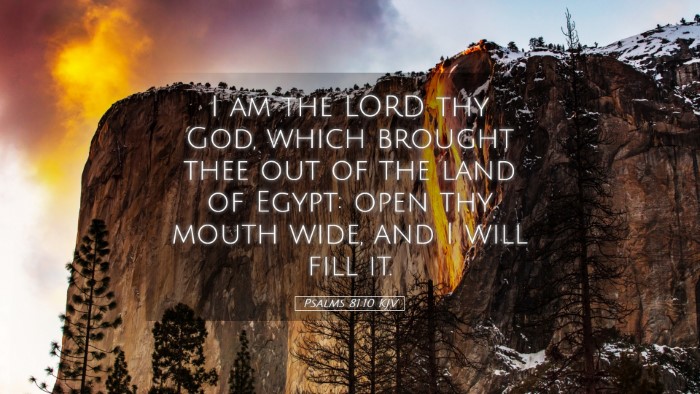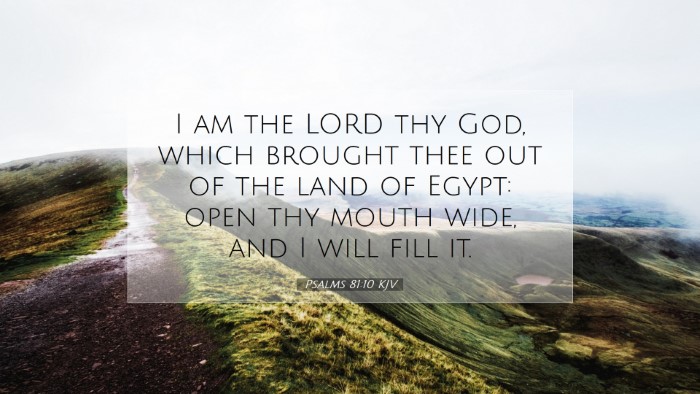Psalms 81:10 - Commentary Summary
Verse: "I am the LORD your God, who brought you up out of the land of Egypt; open your mouth wide, and I will fill it."
Introduction
This verse, Psalms 81:10, encapsulates God's invitation and promise to His people. It is embedded within a context that recalls God's redemptive acts and calls for obedience and worship. In this commentary, insights from renowned public domain scholars such as Matthew Henry, Albert Barnes, and Adam Clarke are synthesized to provide a meaningful exploration of this scripture aimed at pastors, students, theologians, and Bible scholars.
Historical Context
The Psalms were composed over various periods, often reflecting the experiences of the Israelites. In Psalm 81, God is portrayed as a nurturing creator who desires a deep, personal relationship with His people. The backdrop of Egypt's oppression is significant; it lays the foundation for understanding God's saving power and the covenantal relationship He established with Israel.
Verse Analysis
“I am the LORD your God”
Henry emphasizes the importance of recognizing God’s sovereign claim over His people. This title asserts not only identity but also ownership and authority. God, as the Divine Protector and Provider, expects His people to acknowledge His lordship in their lives.
“Who brought you up out of the land of Egypt”
Barnes notes that God references the Exodus, highlighting His mighty acts of deliverance. This remembrance serves as a reminder of God's power and faithfulness, prompting His people to respond in gratitude and worship. It is a call to remember the past rescue as a testament to His constant presence and support.
“Open your mouth wide”
Clarke interprets this phrase as a metaphorical invitation for God's people to express their needs and desires. It signifies a call to faith, encouraging Israel to trust in God's provision. The act of opening their mouths wide is symbolic of an abundance of expectation and dependence upon God.
“And I will fill it”
Henry draws attention to the conditional promise embedded in this statement. God’s willingness to fill the mouths of His people reflects His generosity and readiness to bless. It also implies a response; when believers open their hearts and lives to receive from God, they will experience His abundance.
Theological Implications
- Divine Sovereignty: This verse underlines God's supreme authority and ability to act in history for the salvation of His people.
- Expectation of Worship: The idea of opening one's mouth wide implies a call to worship and a posture of expectation towards God’s faithfulness.
- Faith and Trust: The invitation to open one's mouth signifies an essential aspect of faith—trusting God to provide all that is necessary.
- CovenANT Relationship: The reference to deliverance from Egypt aligns with the broader narrative of Israel's covenant with God, emphasizing their identity as His chosen people.
Applications for Today
This verse holds significant relevance for contemporary believers, echoing the need for reliance on God in every aspect of life. It calls for:
- Reflection: Believers are encouraged to meditate on God's past deeds, fostering a deep appreciation of His unchanging nature.
- Openness in Prayer: The metaphor of opening one's mouth wide serves as an encouragement to approach God boldly in prayer, confidently presenting their requests and needs.
- Active Worship: Engaging in worship as a response to God's faithfulness can lead to deeper spiritual satisfaction and joy.
- Expectation of God's Provision: The faithful are invited to anticipate God's blessings, fostering an attitude of gratitude and trust in His continuing work in their lives.
Conclusion
Psalms 81:10 serves as a timeless reminder of God's faithfulness, His call for relational intimacy, and the importance of faith and expectation in the life of a believer. As noted by the commentators, this verse is not just a historical reference but an ongoing invitation for God's people to open their hearts and experience the fullness of His provision. By embracing the truths found within this scripture, believers today can cultivate a deeper relationship with God, fostering an attitude of trust and dependence that leads to abundant life.


